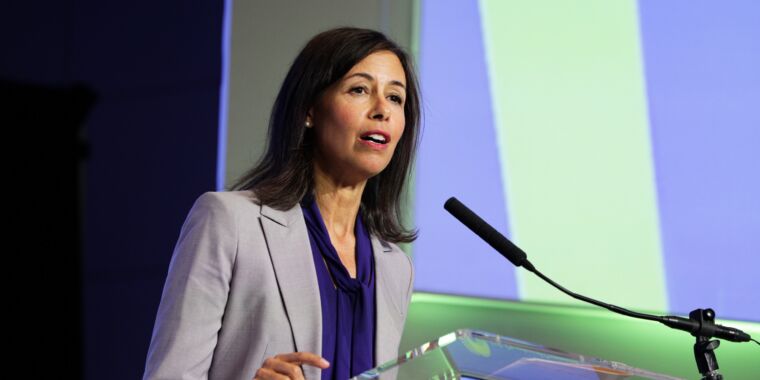Net neutrality’s court fate depends on whether broadband is “telecommunications”

Getty Images | Bloomberg
With the Federal Communications Commission preparing to reimpose net neutrality rules and common-carrier regulation on Internet service providers, the broadband industry is almost certain to sue the FCC once the decision is made.
The Democratic-majority FCC is expected to define broadband as a telecommunications service, which means it would face common-carrier regulations under Title II of the Communications Act. Industry trade groups that represent Internet service providers will likely argue, as they have unsuccessfully argued before, that the FCC does not have authority to classify broadband as a telecommunications service.
Federal appeals courts upheld previous FCC decisions on whether to apply common carrier rules to broadband, a fact that current agency officials point to in their plan to revive Obama-era regulation of ISPs under Title II. But some legal commentators claim the FCC is doomed to fail this time because of the Supreme Court’s evolving approach on whether federal agencies can decide “major questions” without explicit instructions from Congress.
The major question here is whether the FCC has authority to decide that broadband is a telecommunications service, which is important because only telecommunications services can be regulated under Title II’s common-carrier framework. The FCC currently regulates broadband as an “information service” under the less stringent Title I.
“A Commission decision reclassifying broadband as a Title II telecommunications service will not survive a Supreme Court encounter with the major questions doctrine. It would be folly for the Commission and Congress to assume otherwise,” two former Obama administration solicitors general, Donald Verrilli, Jr. and Ian Heath Gershengorn, argued in a white paper last month. According to Verrilli and Gershengorn, “There is every reason to think that a majority of the Supreme Court” would vote against the FCC.
Paper funded by telco and cable lobby groups
Verrilli and Gershengorn express their view with a striking level of certainty given how difficult it usually is to predict a Supreme Court outcome—particularly in a case like this, where the agency decision isn’t even finalized. While litigation in lower courts is to be expected, it’s not even clear that the Supreme Court will take up the case at all.
The certainty expressed by Verrilli and Gershengorn is less surprising when you consider that their white paper was funded by USTelecom and NCTA–The Internet & Television Association, two broadband industry trade groups that sued the Obama-era FCC in a failed attempt to overturn the net neutrality rules. The groups—which represent firms like AT&T, Verizon, Comcast, and Charter—eventually got their way when then-FCC Chairman Ajit Pai led a repeal of the rules in 2017.
But the industry-funded white paper has gotten plenty of attention, and the FCC is keenly aware of the so-called “major questions doctrine” that it describes. The FCC’s Notice of Proposed Rulemaking (NPRM), which is pending a commission vote, will seek public comment on how the major questions doctrine might affect Title II regulation and net neutrality rules that would prohibit blocking, throttling, and paid prioritization.
This article will examine the major questions doctrine and includes interviews with lawyers who argued both for and against net neutrality rules in court cases during the Obama and Trump eras.
SCOTUS outlines major questions doctrine
In its June 2022 decision in West Virginia et al v. Environmental Protection Agency, the Supreme Court said:
Precedent teaches that there are “extraordinary cases” in which the “history and the breadth of the authority that [the agency] has asserted,” and the “economic and political significance” of that assertion, provide a “reason to hesitate before concluding that Congress” meant to confer such authority. Under this body of law, known as the major questions doctrine, given both separation of powers principles and a practical understanding of legislative intent, the agency must point to “clear congressional authorization” for the authority it claims.
In 2015, the EPA issued a rule for existing coal-fired power plants that included a requirement to reduce their own electricity production or subsidize increased production from natural gas, wind, or solar sources. The 6-3 decision in West Virginia v. EPA authored by Chief Justice John Roberts held that Congress did not grant the EPA authority to do this in the Clean Air Act.
While this wasn’t the first major questions case, the Verrilli/Gershengorn white paper said the Supreme Court’s EPA decision “reaffirmed the importance of the major questions doctrine” with “striking clarity.” They wrote that the Supreme Court “is reclaiming the primary authority to determine the meaning of the statutes that federal agencies implement.” The FCC will suffer the same fate as the EPA, they argued.
The Verrilli/Gershengorn summary of major questions doctrine is that if a “statute invoked by the agency lacks a clear congressional authorization for agency action on a major question, then the agency lacks the authority to act at all. Put simply, if the statute is not unambiguous, a reviewing court must invalidate the agency policy.”



